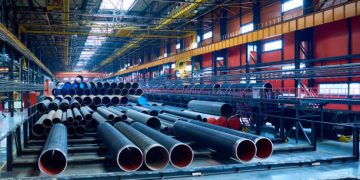By supplychainreport
Europe’s steel industry is under significant pressure due to a sharp increase in U.S. import tariffs, high regional energy costs, and rising volumes of low-cost imports from Asia, according to a senior executive from German industrial conglomerate ThyssenKrupp.
Ilse Henne, a board member of ThyssenKrupp and CEO of its Materials Services division, warned during a recent European Policy Centre conference in Brussels that the region’s steel sector is at risk. The U.S. administration’s recent decision to double tariffs on steel and aluminium imports—from 25% to 50%—has heightened concerns across European manufacturing.
“Steel is at the beginning of the value chain,” Henne said. “Disruptions here create instability across supply chains, as companies must now contend with significantly more expensive steel.”
Steel and aluminium are critical to industries ranging from automotive and aerospace to construction and consumer goods. Henne emphasized that a weakened European steel sector could endanger a wide range of downstream industries across the continent.
She also urged policymakers to take action, particularly in relation to energy pricing. “A competitive steel industry is essential not just for economic stability, but also for broader industrial resilience,” she said. “Competitive energy pricing and strategic investment in clean technologies like hydrogen are necessary to safeguard the sector.”
Meanwhile, Europe continues to grapple with a growing volume of imported steel. According to Eurostat, steel imports from China rose by 36% in the first quarter of 2025, prompting ongoing trade discussions between the EU and Chinese officials regarding potential overcapacity and product dumping.
The U.S. tariff increase currently does not apply to the United Kingdom, which is operating under a bilateral agreement expected to reduce the rate to zero by mid-July. However, there is ongoing scrutiny over UK steel producers’ supply chains, particularly concerning imported semi-finished materials and ownership links to international groups.
The EU’s steel trade association, Eurofer, recently stated that the tariff changes have delivered “a severe blow” to expectations for the sector’s recovery. In its second-quarter outlook, Eurofer called for emergency policy support to protect the industry from further decline.
Despite the trade environment, Henne expressed concern that elevated tariffs might ultimately have unintended consequences. “Price increases among U.S. steel producers following the tariff hike could raise manufacturing costs and limit future industrial growth,” she said.
She concluded by encouraging European leaders to prioritize sustainable energy transitions and economic safeguards for the steel sector, calling it “an essential pillar of the value chain.”
#EuropeanSteel #TariffImpact #EnergyCosts #ManufacturingNews #SupplyChainUpdate















